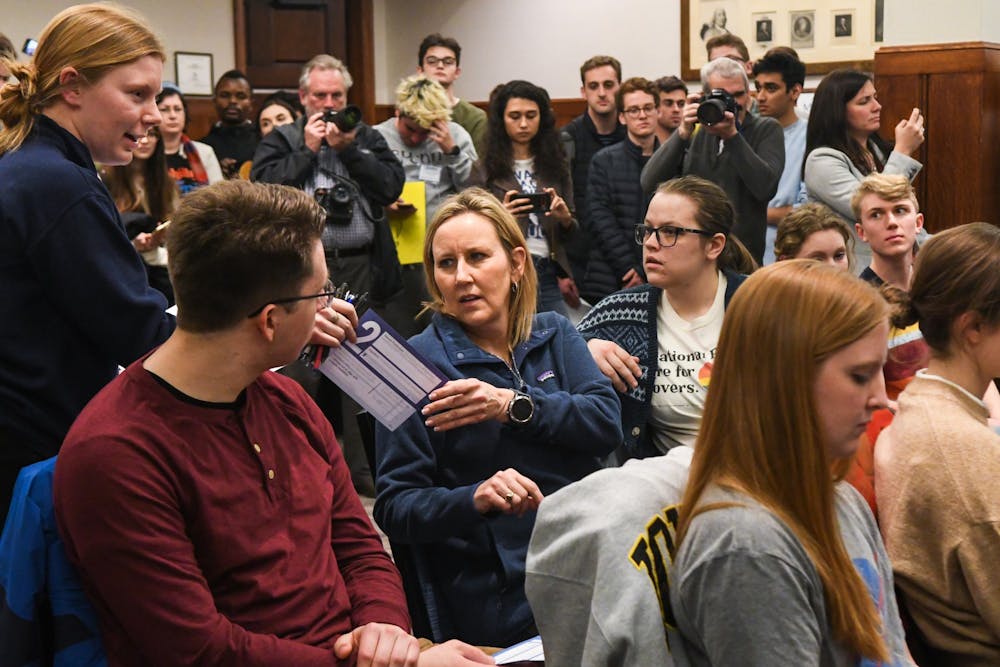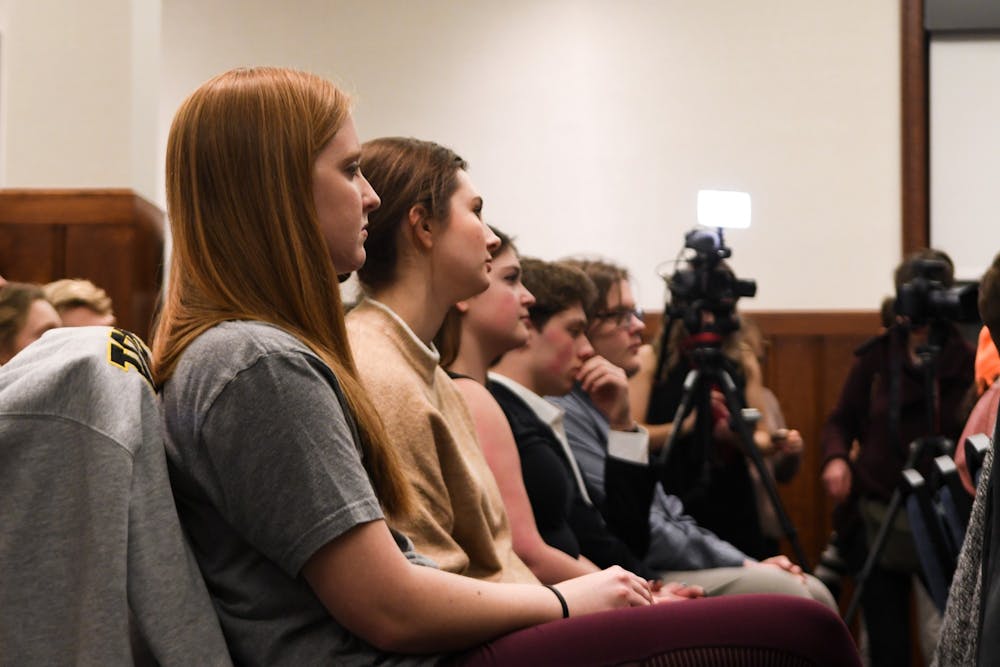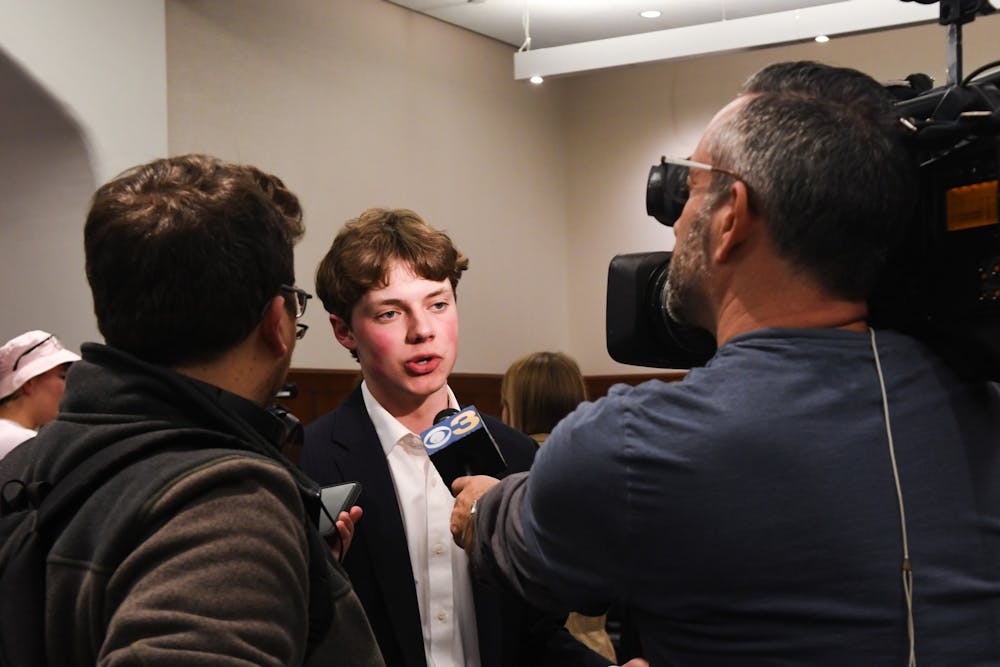
Caucus Chair EJ Carlson distributed preference cards to caucus-goers amidst the many observers.
Credit: Kylie CooperOn caucus day in Iowa, chaos reigned late into the night as inconsistencies meant no official results were released in the first vote of the 2020 Democratic presidential primary election.
But over 1,000 miles away in Houston Hall, the Penn community satellite caucus lent its support to Sen. Bernie Sanders (I-Vt.), Sen. Elizabeth Warren (D-Mass.), and former South Bend, Ind. Mayor Pete Buttigieg. Sanders triumphed with six supporters, followed by four each for Warren and Buttigieg.
On Monday evening, Penn hosted an Iowa satellite caucus in Houston Hall, where 14 registered Iowa Democrats living in the Philadelphia area gathered to advocate for their preferred candidates, while their counterparts did the same back home.
More than 50 onlookers – both from local media outlets including the Philadelphia Inquirer, 6ABC News, WHYY, and members of the Penn and Philadelphia community at large – stood on the sidelines to observe the only Iowa satellite caucus in Pennsylvania.

14 registered Iowa Democrats gathered at the Iowa satellite caucus in Houston Hall.
For a candidate to be considered viable in any caucus, they must gain the support of at least 15% of participants. Caucus-goers participate in two voting rounds known as first alignment and realignment. Supporters of unviable candidates could be swayed to join other candidates during the final alignment. At Penn's satellite caucus, three of the 14 participants would have to declare their support for a candidate to be considered viable.
In the first alignment, five caucus-goers declared their support for Sanders, three for Warren, two for Buttigieg, two for Andrew Yang, one for former Vice President Joe Biden, and one for Sen. Amy Klobuchar (D-Minn.).
After discussion amongst participants, those who originally aligned themselves with a candidate and deemed unviable were able to realign themselves with another candidate, while the eight participants who originally aligned with viable candidates Sanders and Warren were locked into their positions.
In the second alignment, Sanders received six supporters, and Warren and Buttigieg each received four.

Observer turnout in support of Warren was strong and the caucus concluded with 4 supporters for the candidate.
Penn's event was one of the 99 approved Iowa satellite sites around the world, where voters who could not be in Iowa caucused as part of one larger 'county' outside of the state. Other satellite sites included Paris and Glasgow, Scotland – in addition to the 1,678 simultaneous precinct caucuses that took place within the borders of Iowa.
The Penn satellite caucus was organized by College junior and Iowa resident Jessica Anderson and chaired by College junior EJ Carlson, former president of Penn Democrats.
The Iowa caucuses, which occur in lieu of a state primary, play a significant role in election seasons. Since 1972, the Iowa has been the first of the 50 states to formally engage in national election decision-making. The Iowa caucuses are generally seen as indicators of how candidates will perform later on in the election season.
These caucuses often require people to reexamine their position for the good of the common party. Anderson said she had to make some difficult choices. Though she originally spoke on behalf of Yang, Anderson switched to support Buttigieg in the realignment after Yang was deemed non-viable.
Anderson and Wharton sophomore Matthew Current were among the only Penn undergraduates in attendance. Other participants included students from Temple University, Drexel University, and even one Iowan in Philadelphia on a business trip.
Current, who has door-knocked for Buttigieg in Iowa, supported the former mayor in both alignments.

Current was one of the four final Buttigieg supporters.
"I think he’s a really inspiring candidate – a small town mayor, a veteran. He’s running a really civil campaign,” Current said in a speech to the caucus-goers. "I think he can unite America in a way that is required in a post Donald Trump era where the country’s been ripped apart to some extent.”
Though he could not vote, Upper Darby High School junior Jack Diprimio traveled from home to observe the caucus and engage with some of the participants. Diprimio described the satellite caucus as “chaotic, but beautiful.”
“It was chaotic in the sense of the pressure that built in this room and kind of elevated as the Yang people tried to convince Sanders supporters, and as I tried to convince some undecided supporters to endorse Warren," Diprimio said. "It’s a lot of pressure, but it was also beautiful in the sense that this is what democracy looks like."
Despite the small turnout from Iowans, Anderson said the discussions and outsider participation at the event far exceeded her expectations.
“I do think there was a moral failing in 2016 among American voters, when they decided that their vote didn’t matter," she said. "So, I’m really hopeful for 2020. I feel like, if you came out to participate or watch a caucus tonight, there’s no reason that you can’t come out to the general election.”
The Daily Pennsylvanian is an independent, student-run newspaper. Please consider making a donation to support the coverage that shapes the University. Your generosity ensures a future of strong journalism at Penn.
Donate



